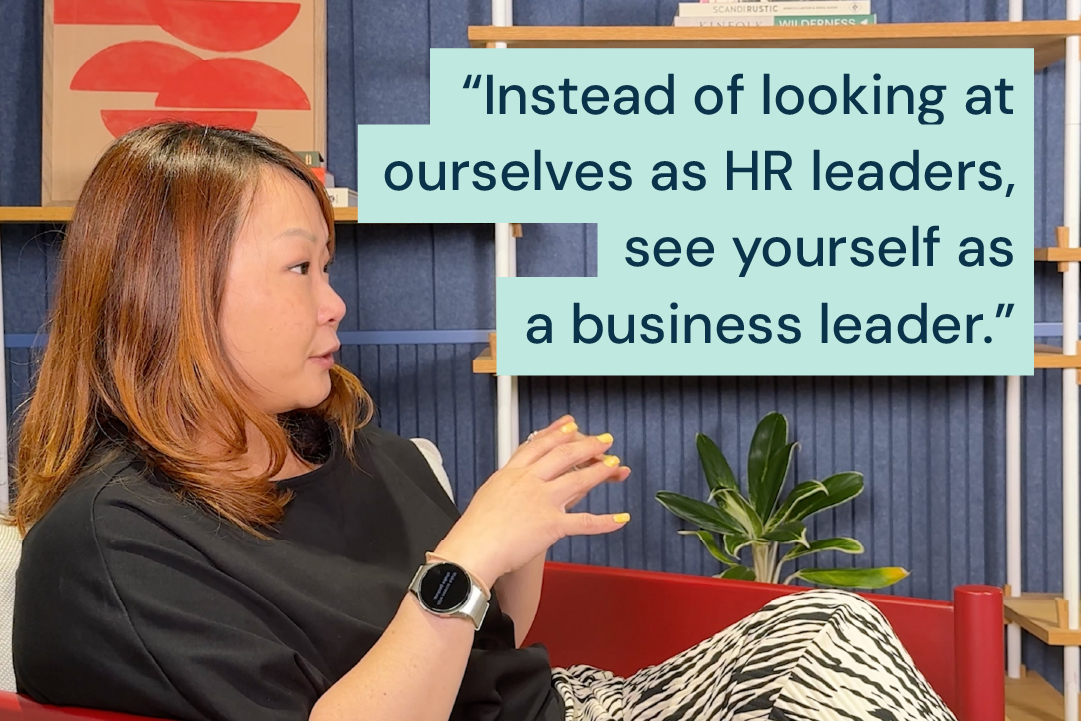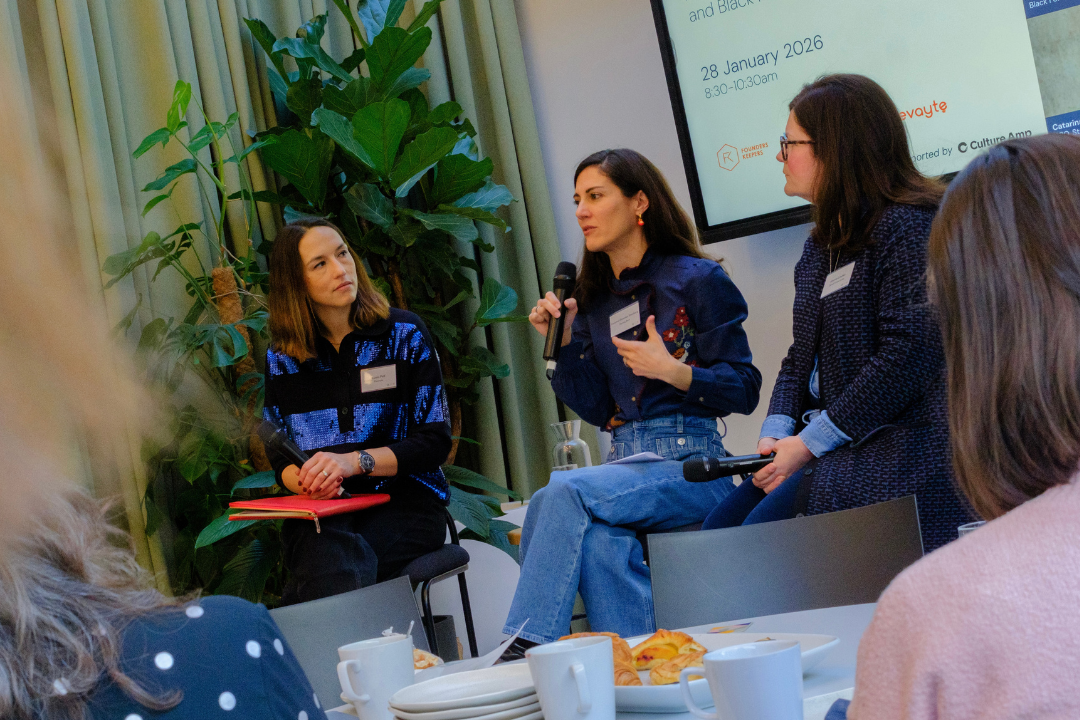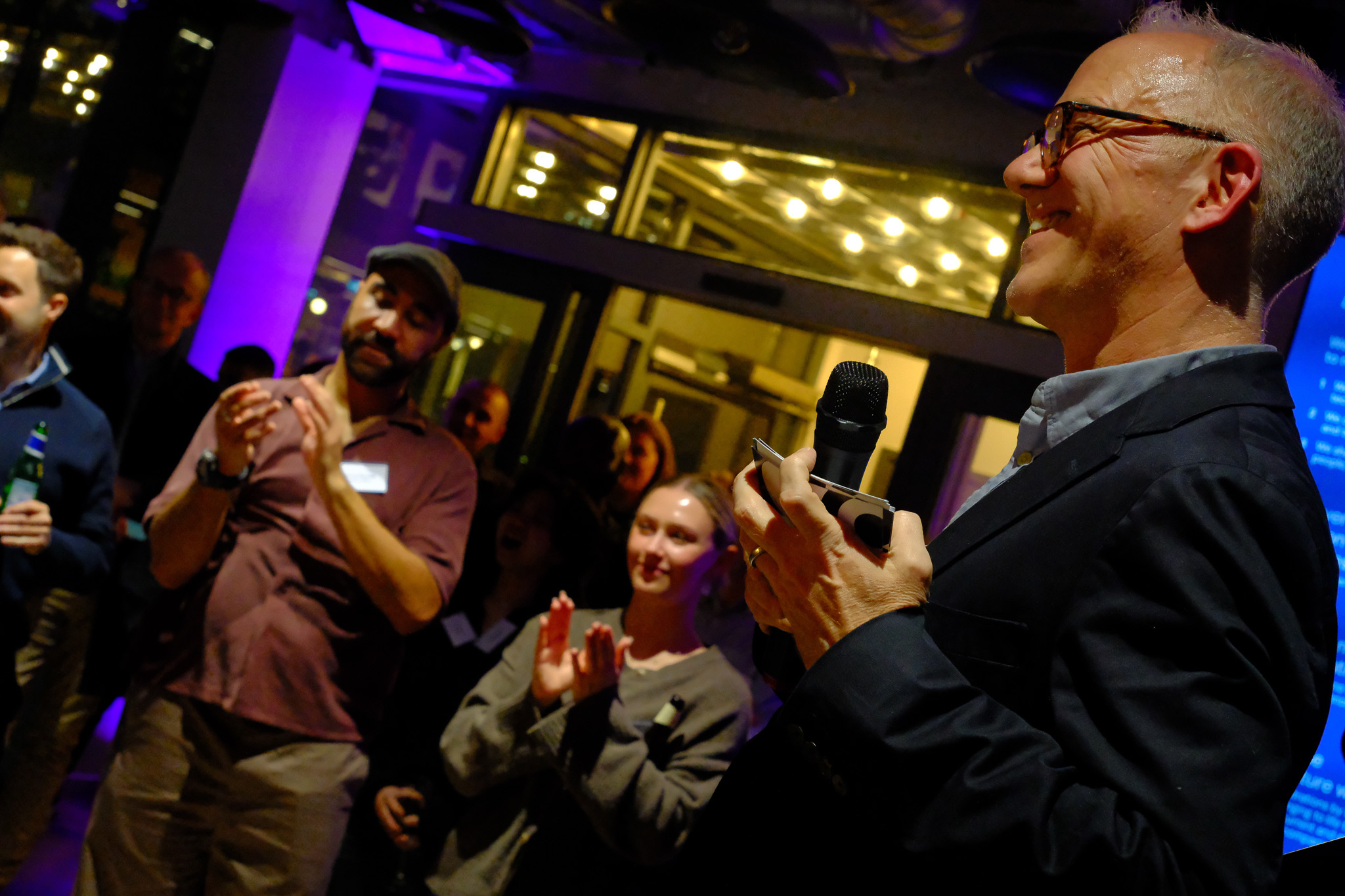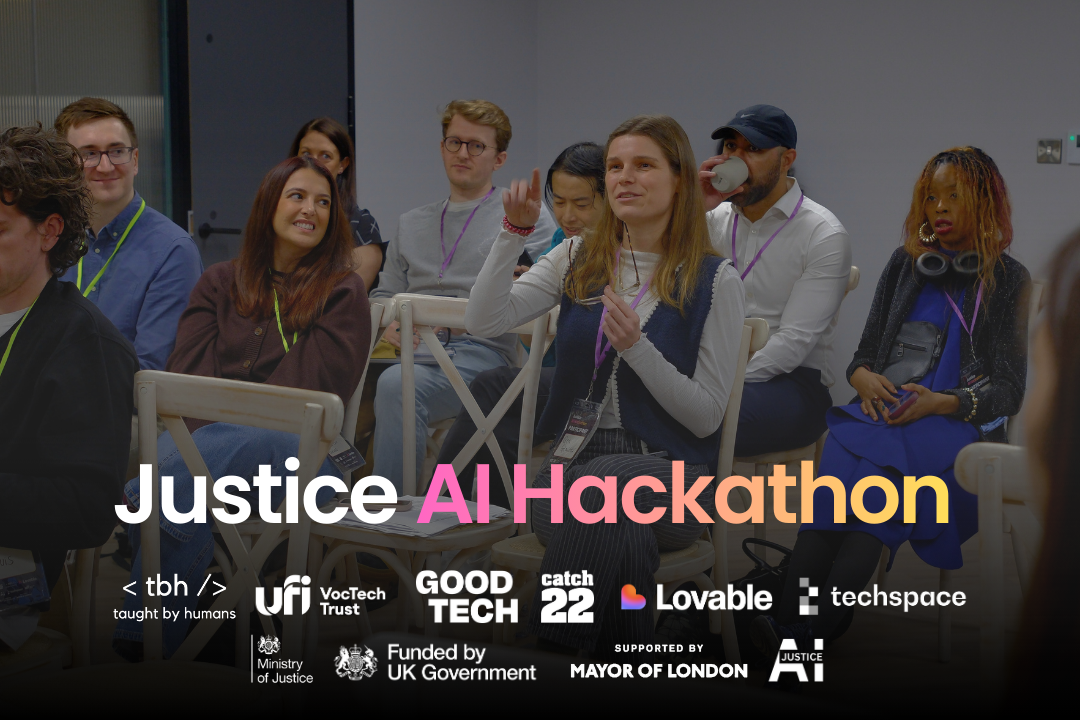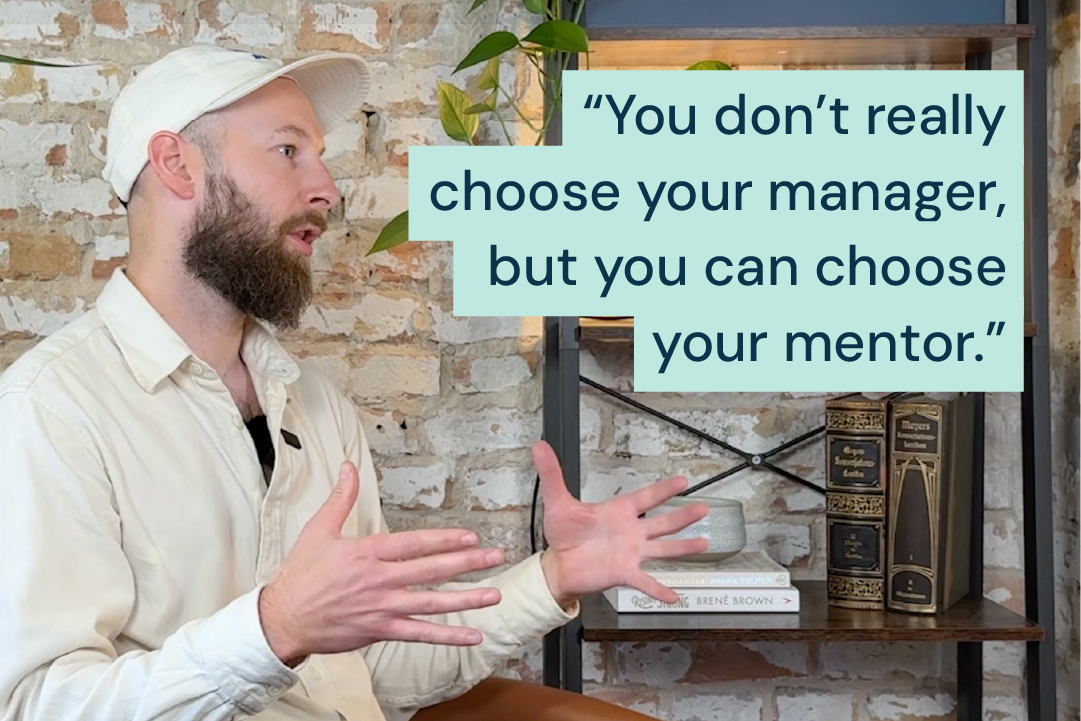JooBee Yeow shares how tomorrow’s People leaders break out of the HR lane to create real business impact: build influence (even as an introvert), collapse silos, and drive bottom-line decisions.
Top 3 Learnings from the Episode
- HR can be a strategic function – and mindsets need to shift
“Start simple. It starts with the mindset. Instead of looking at ourselves as HR leaders – or any exec looking at themselves as a functional leader – see yourself as a business leader. If you are at the exec table, you are responsible for the business. So start with the mindset shift first: what does the business need to achieve, and how can our function enable that?” - People-driven decisions are better business decisions
“If we see that all functions overlap, there’s only one goal: the business. People are not separate from the business. There needs to be an overlap.” - Ask greater questions beyond the People aspect
“Don't just filter for HR things you want to hear; actually listen to the problems—what’s the problem when it comes to building product in our business, or what's the problem that we're not generating more revenue?”
_____
Check out the full conversation below
About The Techspace Pod
The Techspace Pod cuts through the noise to spotlight the European founders, operators, and investors building what’s next — from inside the change-making teams shaping tech in Berlin, London, and beyond.Each episode delivers sharp insight from Techspace member companies and the people redefining the ecosystem – from frontier tech and funding, to team culture and scaling strategies.
_________
Episode #3: JooBee Yeow (Advisor to Founders) on inspiring HR leaders to become business leaders.
Jane: Hello and welcome to the podcast. I'm Jane Wakefield, your host, and I'm delighted to say that I'm here with JooBee Yeow, a people leader. The old-fashioned phrase is “HR leader”. Which do you prefer?
JooBee: I do not mind, because a rose by any other name is still a rose.
Jane: Quite right indeed. Well, welcome. Thank you so much for joining us.
JooBee: I'm so excited, Jane.
Jane: Now, look, the first thing I'm going to talk about is you, and I'm going to get quite personal because I was reading your LinkedIn profile and I spotted that you called yourself a “proud introvert”. And I love that phrase, because I'm a big fan of the TED Talk by Susan Cain that talks about the “power of introversion” and the way that we can use people with very different personality traits and everybody will feed into a company. We don't all need to be extroverts. So, tell me a bit about why you've labelled yourself like that.
JooBee: Susan is my absolute hero. I was really glad when she did her TED Talk, and it brought so much visibility to what an introvert means, because sometimes the assumption is introverts are awkward, they don't enjoy crowds, or they are shy. Actually, those characteristics are not necessarily true.
The key thing about being an introvert is: how do you recharge so that you can be your best self? So, for example, people say they don’t realise I’m an introvert when I socialise or when I do what I do, because I’ve had time to recharge. But when I recharge, I do not talk to anyone.
I remember one example: I didn’t leave my flat for eight days because it was Christmas time. Nobody needed me. My partner was at home, so I had time to recharge. And the only reason it was eight days, and not 10 or 14 days, is because the delivery driver couldn’t find my flat, so I had to go out to find them. After that I came back energised, recharged, and able to be my best self.
Jane: I mean, that's a really interesting point you make, because we should all perhaps recharge by doing something like that. The other thing that somebody who's an introvert brings as a special skill is they’re very, very good at listening, which I imagine is a handy skill if you're in HR but also if you're a founder. We were talking before about how founders have to sort of play this role of being very confident and very out there, but there are as many personality types among the founding community as there are in any other walk of life—from people who are just inventors and aren't very good with people, all the way through to those that have everything. So, what's your advice to founders when it comes to dealing with their own personalities?
JooBee: For so many years we expected leaders to be charismatic—everything we watch in Hollywood movies—and that puts an expectation on leaders, and therefore founders, that they need to be like that.
So, number one, recognise that there’s a difference. And number two, play to your strengths. I was having a conversation with a founder recently and he said, “JooBee, I can’t do that. I can’t be charismatic. That’s not me.” I’m like, “Don’t be not you then. What are you good at?” He said, “I love reading. I love reflecting on what we have achieved, and I love to write.” I was like, “Write it. Write a newsletter for your employees every month—updates, your thoughts. Help people. The key is people want to know you. They want to know what you think. You can communicate it in an all-hands, or you can communicate it in any medium that achieves the same outcome.”
Jane: I mean, that's great advice and actually leads me on to talking more about the industry that you're in. HR being able to offer that kind of advice is invaluable, but often that's not seen as the role of HR, is it? The role of HR is seen as a bit separate and somebody you come to later in your journey.
JooBee: Yeah.
Jane: You've used the word “reactive”, which I guess means they should be more proactive. So talk me through a little bit about how you think HR departments can be more at the heart of businesses.
JooBee: If we look at what HR typically does, sometimes we think, “Okay, we lead a function—we lead the HR function—we need to deliver on HR stuff.” I'll give a very tangible example. HR leaders will often say to me, “We don't have a strategy. I can't craft my strategy because our business doesn't have one.” In startups that is quite normal, because your founder might be—it might be their only job; it might be their third job in their life. So somebody needs to coach them. Somebody needs to facilitate that. Who in the exec team has the skill to coach and facilitate? The role of an HR leader naturally comes with that skill anyway.
So we actually have the skill and the role to facilitate, guide, and coach our founders in terms of business strategy.
The next question will always be, “But JooBee, I don't know anything about business.” You might not know it now, but that's okay. The key skill is to help your founder reflect, think, prioritise—start there. And as you're doing that, you start to get to know the business. So that's where we can be more proactive and recognise that our role is beyond executing on people or HR initiatives, but actually being part of the business as a whole.
Jane: And that's really important because whenever you talk to companies, they will always say that at their heart is the people.
JooBee: Yes.
Jane: It's all about the people. And yet the department that is all about the people is often not making—or helping make—those sorts of strategic decisions. Why do you think that has historically been the case? Do you think that's changing now?
JooBee: What normally happens at an exec table is you have leaders from different departments, and everyone will think, “I'm responsible for marketing, for sales, for tech, and therefore HR for HR.” So if you look at the Venn diagram, it becomes like separate circles rather than an overlap of all the components. And that is a problem not just for HR. Because if we think about this—take a very real example—during an executive meeting, when we talk about people stuff other execs are probably replying to Slack messages, and when other execs are talking about sales projections, we probably zone out. That shouldn't be the case. If we see that all the functions overlap, there’s only one goal: the business. People are not separate from the business. It needs to be an overlap.
Jane: Actually, in a startup that should be kind of easier than in a big corporation where there are hundreds and hundreds of people in each department. And it does make total sense, doesn't it, that everybody sort of knows what every other department is doing. And sometimes when someone joins a job, they'll do a bit of that, won't they—a bit of shadowing and learning the business—but then that dies off. Would you advocate that we keep that going and that we all learn what other parts of the business are doing all the time?
JooBee: If we look at a startup’s journey, there are about three broad stages. The first one is exactly what you just described, where everybody is involved in everything—you’re still small. When the startup finds its product-market fit, what normally happens is you get funding to scale. And when you scale, you start to create specialisms, so different departments. And the difference—because when you were saying that I was like, yes—there’s one thing about startups that’s different and causes this: speed. As quickly as you can, you need to scale. So you run fast in your own direction. When that happens, you start to become siloed—even though you're small—because you're running so fast. But back to your point, Jane, yes, we must continue to overlap and be interested in what other departments are doing, because if not, we are making decisions in silos.
Jane: So what would your advice be to people who work in HR to make what you've just described a daily reality? It's easy to talk about it, but it's not always easy to implement it.
JooBee: It can also feel overwhelming, because you're like, “I'm already so busy with my stuff; I need to learn about everything else in the business.”
One thing I always say is: start simple. It starts with the mindset. Instead of looking at ourselves as HR leaders—or any exec looking at themselves as a functional leader—see yourself as a business leader. If you are at the exec table, you are responsible for the business. So start with the mindset shift first: what does the business need to achieve, and how can our function enable that?
Jane: That's really good advice. And obviously at the moment there are an awful lot of pressures on businesses, and that filters down to HR in terms of hiring and firing. Do you see that pressure easing, and how do you cope with that when we're in such turbulent economic times?
JooBee: Speaking of the startup ecosystem, if we look at the past many years, funding was flowing and the focus was simple: grow at all costs. However, now, as you mentioned—with economic uncertainty, AI disruption, tighter funding—the reality startups are facing is very, very different to what we're used to. That means startups need to rally the whole organisation to adapt, survive, and stay on that path of growth. Therefore, what was expected of HR previously—when funding was flowing—our core role was very much in hiring, benefits, onboarding; very functional-level work. That was probably fine at the time, but we now need to be able to rally the business, as I mentioned.
Jane: Yeah. So basically, are you saying that you have to find a happy medium between the two?
JooBee: The shift that's coming—we can handle it. It's not new. It's just that we haven't flexed that muscle because of the good times.
Jane: Yeah, I see; that makes sense. You mentioned two things in what you were saying, and I want to draw a bit more out of them. The first was benefits. It feels to me that we've gone from a world where you went along to a job and you were told what the job would entail and then you just said yes or no, to a world where you now say, “Well, I want this and I want that and I want the other.” Is that a fair assessment, and is that shift good—that we're giving a bit more power to the employees even before they've got the job?
JooBee: That is not the problem at the moment in startups. What's happening in startups is they need to achieve more with less—a very tight squeeze. The difference is: you literally may not exist in two years’ time, versus other businesses where they might ride the wave. They might not have more profit; they might not grow revenue, but they are sustainable. Startups aren’t. If you don't get it right, you're not getting the next round of funding—and that's the end. That has been happening in the last two years in startups.
HR should be able to help the business, but they are not at the moment, and founders are very frustrated. I want to find a way to motivate HR to start thinking from the business perspective, or else they will always be against what the business needs to achieve. And the business now is very nervous that they might not make it.
Jane: So you've laid out the intent, which is to think more from a business perspective, but what are the steps to getting there?
JooBee: Yes. What HR leaders need to do now is really understand the business. Start small. It can be daunting—you might feel like, “Oh my God, do I need to do a whole MBA for this?”
Start small. Start this week. Do one small thing. It could be sitting in your product or sales meeting. Listen to what your leaders are worried about.
Don't just filter for HR things you want to hear; actually listen to the problems—what’s the problem when it comes to building product in our business, or what's the problem that we're not generating more revenue? What are they concerned about?
With that in mind, when you start looking at what we need to do for our people, you are grounded by what the business needs. That could be one.
The other one—tied to the first—is: look at what you're doing right now in HR—the projects, the initiatives. How are they aligned to what the business needs? Ask the hard question. If they don't, then they're not delivering value.
Yesterday I had a conversation with an HR leader, and it was really, really sweet. She had attended my boot camp a couple of weeks ago and she said, “JooBee, I realised that last year I was so proud of one HR project I did—so proud because it was so cool—and it connected to nothing in the business.”
Jane: Cool.
JooBee: The self-awareness—I love it. She said, “Recently, after the boot camp, I went back to the business. I went to my FP&A guy and I asked for the statements. I tried to understand them. I started to see where the challenges are in different teams—in the different, let's say, revenue teams.” She said, “I went to the head of [inaudible]: your team is underperforming.” He’s like, “You're always telling me.” “But let me show you the numbers. These people have not brought in revenue in the past six months. This is a business problem.” And he started listening, and they started to have a conversation. So when we understand the business better—the initiative she previously wanted, which was manager training—she recommended to the VP what he needed to do with this team. For the past 12 months they were not listening to her.
The initiative she recommended again recently is the same initiative, but because the conversation is anchored in the business need, “now I am heard.”
Jane: Fascinating. Now I want to talk about the boot camp, but before we get on to that, another thing you mentioned—which is a scary thought—is that some of these startup businesses just won't exist in two years, and some of that will be down to the threat of AI. So let's talk briefly about AI—both in terms of the general threat to jobs, but also in terms of HR itself, whether it’s bringing benefits there. Shall we start with the wider question?
JooBee: Wider question of AI…
Jane: Being a threat to jobs. We hear this all the time, don't we—that half the jobs we do now aren't going to exist in a few years' time. Do you subscribe to that?
JooBee: I believe that is true, because we have seen that every time there is technological disruption. But the beauty of it is new jobs will also be created that we cannot even imagine right now. So the key—in startups, if we look at company level—is: how agile are we to adapt to change, and then how agile are our people to adapt to change? That involves looking at the business: what do we need? What we need usually ties back to how we enable that through our people. What capabilities are needed? The job might change, and we need to enable our people to grow the skills towards what’s needed. That is the key. That is evolution.
Jane: Specifically in the world of HR, we're seeing AI disrupting industries but—in a good way—bringing more efficiencies, freeing up people to do more things. Is that the case in HR too?
JooBee: It should, yes—because it cuts across everything we do. Two parts. With HR, we’re not just leading our function; we’re enabling the business. So many HR leaders are thinking, “How can I enable my function?” I would say: start with the business again, because your business needs to achieve whatever goal it has. If we look at startups, with funding being tighter, we cannot hire the way we used to—which means the workload remains the same if we want to grow, but we have less funding to hire more people to do the work. That is where you go, “Okay, if the business needs to achieve this goal, and we can't hire people to do the work, how can we leverage technology—and in this case AI—to achieve the same goal, and even better than what we thought we could?” It's not just about cutting operational work and being more efficient; it’s also about the value we can deliver—not just in quantity but quality. I don't know if that makes sense.
Jane: It does. It makes perfect sense. Now let's talk about your journey, because you started off in HR departments and now you're coaching HR leaders. What led to that change, and tell me a bit about both sides of the coin?
JooBee: I used to work in startups where I joined when they were ready to build to scale. I came from a systems engineering background, so I love that part—how do you enable the system? I worked closely with founders and exec teams, and of course led my own team. I went independent four years ago. I continued to solve the same problem but from the other side, where I work with founders—coach them on how to scale the mindset, shift the capabilities, shift the structure—everything shifts. At that time I thought I would not… this is more personal. When I went independent, I thought I would continue to do the same—but from the other side—coaching founders, their team, and their business to make that transition.
HR was always my community—my people. So I wanted to serve them in different ways through my newsletter, my blog, content—to help them do what they do. But I kept getting requests: “Can you coach me? Do you have a boot camp to help HR step up—either be more strategic, or do what you do?”
So about 12 months ago I had my reflection moment—as an introvert, every few quarters—and I thought: helping founders solve business problems is rewarding, but enabling HR leaders to solve that business problem feels more personal. I've always been very proud when the team I lead grows into their full potential, starts leading their own teams, and becomes the business leaders they aspire to be. I hadn't done that since I left a full-time role. The beautiful thing about running your own business is you have the choice. I thought: could I continue to deliver value for business but also do work that feeds my soul? So I decided to build an HR leadership boot camp for HR leaders, and I'm going to be launching a community for them as well soon.
Jane: Exciting stuff. Now, what's involved in a boot camp? It sounds quite scary.
JooBee: It is—and it’s intentionally called a boot camp because it is intense. Even on my website the communication is: “Expect pain.”
Jane: Oh gosh.
JooBee: Because a boot camp is an intervention. In startups, what we don't have is time. How can I help HR leaders step up as quickly as possible? The boot camp is only four days, across five weeks of support—but four days of core work. In the last boot camp, every HR leader at the end of the day said, “My brain hurts—but in a good way.” Why? Because, number one, the boot camp helps you first to challenge our perspective of what HR leadership is, what our accountability is, and what the change in our role is. Then it covers how you connect what HR does to the business.
Because I specialise in startups, it’s very context-specific: what does your startup need to survive across its growth journey? That is the focus of the boot camp. I am terrible at talking about my own product. I'm so sorry.
Jane: No, it sounds great. And I love the idea that people come out and say their brains hurt. We talked about TED at the beginning—that’s what everyone always says about TED: by the time you end, your brain is exhausted. So it sounds brilliant. You mentioned as well that you train founders, and I wonder if you've noticed anything—if you were to offer tips to founders based on the training you've done, specifically about how you become more people-orientated, or think in a more human way about your teams. What would your top three tips be?
JooBee: So, how can founders think about their people more and be more—
Jane: People-centric, I suppose. As we said earlier, everyone talks a good talk—people are the most important thing—but for a founder profit, keeping the business going, developing the product, finding customers… sometimes those things overtake their teams. So to bring it back to thinking about their workforce, what would the tips be?
JooBee: What I've noticed—there’s a slight difference between founders in startups and, say, CEOs in bigger enterprises. Founders actually care about people. They might not know how to share it. A simple example: they care about people so much that they avoid difficult conversations, because they think they’re being people-centric—they don’t want to hurt someone. What happens is eventually the business catches up. The business needs revenue, profit, etc., and then they get pressure to deliver as founders. Being nice to individuals who are not performing suddenly comes to a halt. And because they didn't want to hurt somebody, the way they actually act hurts them—because they didn't provide feedback up front, so somebody could do something about it. They say, “It's all good,” so it comes as a surprise for someone. Six months later, when you're told you haven't been performing for six months, that immediately breaks trust. So I would say founders actually care about their people, but their behaviours need to be more aligned—don’t let being nice be confused with doing the right thing for your people. If that makes sense.
Jane: Yeah, that totally makes sense. Any other tips? I mean, that's a big enough tip, isn't it, I guess.
JooBee: That is a really important one, because founders—majority of the time—do care, but they avoid the hard conversations that are actually people-centric: giving the power, the time, the autonomy for somebody to do something about what they need to grow or develop.
Jane: Okay. So founders might view HR as a bit of an add-on back-office role. What can they do—founders first—to bring HR more into the conversation?
JooBee: Actually, I would say founders do recognise that HR can add value, but to them it’s a little bit like a black swan. They have heard of it; they have read about amazing HR—like at Netflix—that can deliver business value, but they probably haven’t experienced it themselves. So they do not know what to expect from an HR leader.
Jane: Then throwing that question back to the HR team—often they feel they’re part of the executive team, that they have a seat at the table, but there's no point having a seat at the table if your voice isn't heard. Is it your experience that HR feel their voice isn't heard, and what can they do to make their voice louder?
JooBee: Our predecessors fought for a seat at the table for us, and we do have a physical seat at the table.
Jane: What do you mean by predecessors?
JooBee: We never used to have a seat at the table. HR was a back-office function, and our predecessors—the HR leaders before us, the previous generation—fought for that seat, and we do have a physical seat. But still today we hear HR leaders say we are not being heard, or we struggle to influence business decisions, and sometimes we’re still seen as a back-office function. Coaching many HR leaders, I think there are two main reasons—and if we change these, we’ll have a massive impact, and they are within our control. Number one: when HR leaders step up into a strategic role, many times they don't realise the role has shifted, the expectations have shifted. And if they do, they don't know what that shift—what good—looks like, because unlike bigger organisations where you have a manager or leader who can coach you, you now report to the founder, or you might report to the COO who is probably in the biggest job of their life as well. So you might not know what that shift looks like, and you might not get the support to make that shift.
Number two—more important in my opinion—is we ourselves don't realise the extent of the value of our role and its impact. What I mean, as I mentioned before: we see ourselves as HR leaders accountable for the HR department and what we're doing, rather than being accountable for business results; therefore, we are business leaders.
Jane: So a lot of our conversation has revolved around honesty, I suppose—being honest with yourself and challenging yourself. For both founders and HR leaders, it's about asking difficult questions of themselves or others. It's difficult for us to do that, though, isn't it? As humans we shy away from confrontation—well, apart from journalists; we love it. So what would your advice be to people to get in the right mindset to start having those difficult conversations and start challenging the way they think?
JooBee: In all honesty, unless there is a reason why, we don't spend the time to challenge ourselves. So if you need to find a reason why, look at what is not working around you. And if you want to change it, start questioning: what is not working?
Jane: So if you were going to say to a founder, “You've got to sit down and have a difficult conversation,” do you give them a pep talk on how to go about doing that?
JooBee: Oh—for HR leaders?
Jane: For either. Let's take a founder, for instance. They've got to sack somebody; they've got to have a difficult conversation with somebody about their work—how they're working. How do you prepare them to have that tricky conversation?
JooBee: Okay, my method is a bit unconventional—straight to the point. First thing—I'll caveat this—you've got to have a relationship with the person to have that conversation. I build that first. When the time comes and I need to have that conversation with a founder, I will say, “It's not about you; it's about them,” because many times when they don't have that difficult conversation with an employee, it's not about the employee. It's about them—about the founder—not being able to have the conversation; feeling like they're going to hurt someone. Them… them… them. So: look from the other person's perspective. If you don't have the conversation now, what does it mean for them? What does it mean for them in six months’ time if you don't have that conversation? Shift the perspective of the person who's avoiding the conversation—they're looking too far inwards. Look at what the other person needs.
Jane: Good point. Now we've come to the end of our discussion, and I've thrown a lot of questions at you, but the very final question is about something you perhaps haven't found the answer to yet. Is there a question going around your head—it could be about HR, startups, or something completely different—that you're still searching for the answer to?
JooBee: There are so many. Which one? Why are we afraid to share our thoughts with others at different levels? For example, founders being worried about revenue and profit and being open about it, so that the collective in the business can help to shape it. Why are we afraid to share that we are afraid to do X—whether it is exploring this product or going into this market—or so many things? Why are we afraid to share?
Jane: It's a great question, and one we should all be asking ourselves—not just founders. JooBee, it's been absolutely lovely to talk to you. Thank you so much for joining me.
JooBee: Thank you.

